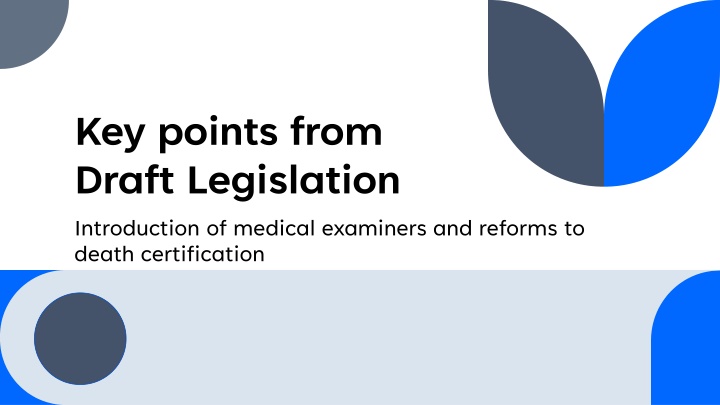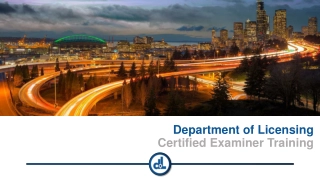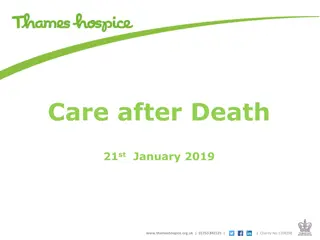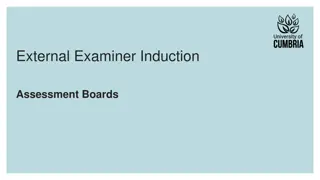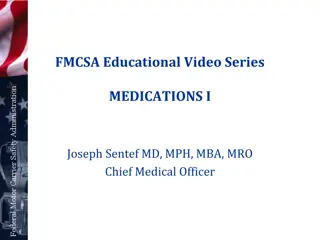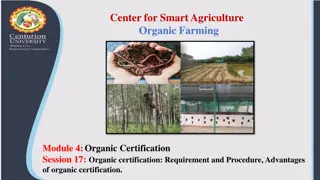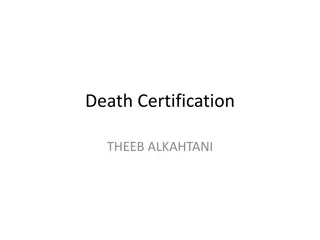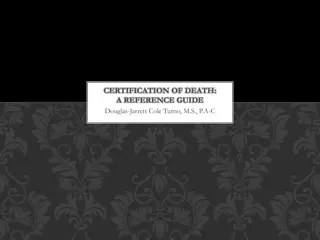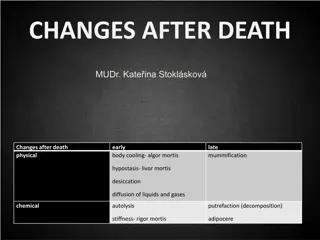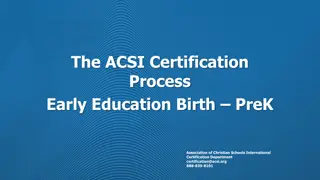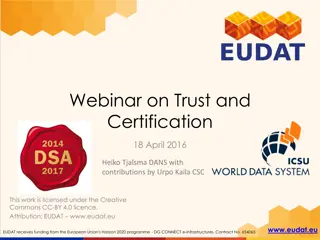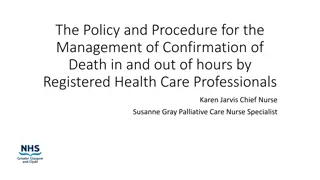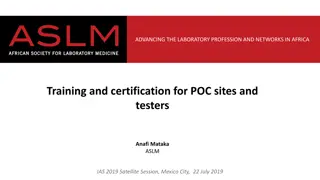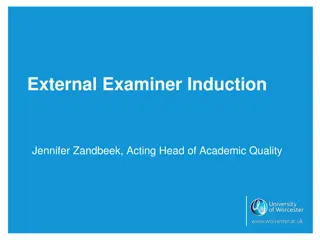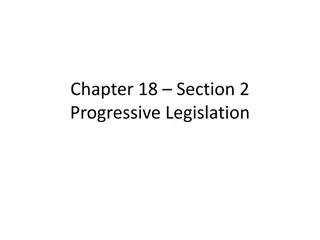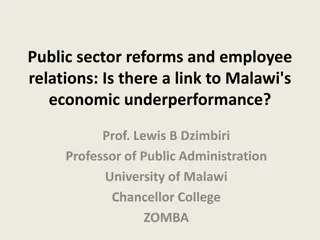Reforms in Death Certification: Introduction of Medical Examiners
Reforms in death certification processes have been proposed through the introduction of medical examiners in England and Wales. This draft legislation aims to bring significant changes that include independent scrutiny by medical examiners for all non-coronial deaths, updates to the Medical Certificate of Cause of Death (MCCD), and the publication of new regulations. The role of medical examiners, changes to legislation, and MCCD updates are key points highlighted in this initiative.
Download Presentation

Please find below an Image/Link to download the presentation.
The content on the website is provided AS IS for your information and personal use only. It may not be sold, licensed, or shared on other websites without obtaining consent from the author.If you encounter any issues during the download, it is possible that the publisher has removed the file from their server.
You are allowed to download the files provided on this website for personal or commercial use, subject to the condition that they are used lawfully. All files are the property of their respective owners.
The content on the website is provided AS IS for your information and personal use only. It may not be sold, licensed, or shared on other websites without obtaining consent from the author.
E N D
Presentation Transcript
Key points from Draft Legislation Introduction of medical examiners and reforms to death certification
Introduction of medical examiners and reforms to death certification Remained largely unchanged for over 50 years. All deaths would be subject to either a medical examiner s scrutiny or a coroner s investigation. Independent scrutiny by a medical examiner will become a statutory requirement prior to the registration of all non-coronial deaths in England and Wales. 2
Changes to Legislation It accompanies the publication of the following draft regulations: The Medical Examiners (England) Regulations 2024 The Medical Certificate of Cause of Death Regulations 2024 The National Medical Examiner (Additional Functions) Regulations 2024 The underpinning primary legislation is: section 21 of the Coroners and Justice Act 2009, which was commenced in June 2018 sections 19 and 20 of the Coroners and Justice Act 2009, which was commenced on 1 October 2023 section 169 of the Health and Care Act 2022, also commenced on 1 October 2023 3
Medical Examiner A medical examiner is a senior medical practitioner who is contracted for a number of sessions a week to provide independent scrutiny of causes of death, outside of their usual clinical duties. Medical examiners provide independent scrutiny of causes of death and will be a contact for bereaved people who wish to ask questions or raise concerns. Independent scrutiny by a medical examiner will become a statutory requirement prior to the registration of all non-coronial deaths in England and Wales. 4
MCCD Updates From April 2024, a new MCCD will replace the existing certificate , the new MCCD will include the following new information: Details of the medical examiner who scrutinised the cause of death Ethnicity, as self-declared by the patient on the medical record. This builds on learning from the COVID-19 pandemic. If the patient medical record does not include this information, then the attending practitioner can complete it as unknown on the MCCD and should not in any circumstance ask for this information from the representative of the deceased Maternal deaths and a new line, 1d, for the cause of death - bringing the MCCD in line with international standards Medical devices and implants will be recorded on the MCCD by the attending practitioner, and this will be transferred to the certificate for burial or cremation (contained in the green form) completed by the registrar in order to inform relevant authorities of the presence of any devices or implants 5
MCCD Updates A new paper version of the MCCD will be distributed before the introduction of the statutory medical examiners system. In addition, DHSC is developing an online version, which will enable the form to be more easily shared between the attending practitioner, medical examiner and registrar. The online version will be available later in 2024. Attending practitioners must share the MCCD and proposed cause of death with a medical examiner, who will scrutinise these before submission to the registrar. (Noted on information from Registrars General Office that ME Office to send over to local registrar). There will continue to be a statutory form to be used when a death occurs after 28 days of life, and a separate form to be used when a live born child dies within the first 28 days of life. 6
Role of the Medical Practitioner A medical practitioner will be eligible to be an attending practitioner and complete an MCCD, if they have attended the deceased in their lifetime. This represents a simplification of the current rules that enable medical practitioners to be an attending practitioner. 7
Medical Examiner Certification Introducing medical examiner certification for the exceptional circumstances where either: There is no attending practitioner An attending practitioner is not available within a reasonable time In either of these circumstances, the death is referred to the senior coroner by a referring medical practitioner (not a medical examiner) and the senior coroner decides not to investigate. In these circumstances only, the senior coroner should refer the case to a medical examiner to certify the death by completing a medical examiner MCCD. They will carry out a proportionate review of medical records. In those circumstances where the medical examiner concludes that they are unable to establish the cause of death, the case will be referred back to the senior coroner. 8
Coroners Referrals Attending practitioners should continue to notify deaths that meet the criteria in those regulations to the coroner, who will determine what further action is appropriate. As at present, the attending practitioner can report a death directly to the coroner where they believe they are under a statutory duty to do so. In this scenario, there will be no regulatory requirement for the attending practitioner to inform the medical examiner that they have done this. Similarly, if the coroner declines jurisdiction, they will advise the attending practitioner. The attending practitioner will be expected to complete the MCCD and scrutiny will be undertaken by the medical examiner. 9
Death Registration Deaths will not be registered until the registrar receives notification of the cause of death from the medical examiner or the coroner. This notification will also start the 5-day statutory time frame to register a death. The responsibilities of the registrar will change as there will be no requirement for registrars to refer deaths to the coroner. The attending practitioner or the medical examiner will determine which deaths need to be referred to the coroner. The need for the form 100A will no longer exist and this form will be removed. The attending practitioner certifying with medical examiner sign-off at first instance, or the medical examiner certifying in exceptional circumstances following referral by the coroner. The Registrar General will no longer have responsibility for providing an MCCD, as DHSC will take over the new form development and supply. 10
Cremation and Burial The medical examiner s scrutiny will make the form Cremation 4 confirmation obsolete and the regulatory requirement for the medical referee to scrutinise it will therefore be removed. Information about medical devices and implants in the body of the deceased (which is currently recorded on form Cremation 4) will be included on the MCCD and in the certificate for burial or cremation (green form), as set out above. 11
NHS trusts, healthcare providers, ICBs and health boards NHS trusts in England which have a medical examiner office, should ensure the medical examiner office is supported in the operational rollout of the medical examiner system before the regulations come into force from April 2024. They must ensure that the independence of medical examiners is respected. All other healthcare providers in England and Wales, including GP practices and independent healthcare providers, must ensure they make the necessary arrangements to inform medical examiners of deaths requiring independent scrutiny and share records of deceased patients with medical examiners in a timely manner. Healthcare providers can already share records of deceased patients with medical examiners and will be mandated to do so when the regulations come into force. 12
Mortality statistics Following implementation of the statutory medical examiner system, the data transmitted to ONS will include some of the new items being collected on the revised MCCD: line 1d of the cause of death information the ethnicity of the deceased (where available) whether the deceased was pregnant or recently pregnant In preparation for these new data flows, ONS is redeveloping its own processing systems and is working closely with the General Register Office to align its systems with theirs. This will ensure a smooth transition that safeguards timely and accurate mortality statistics for the public good. 13
Thankyou for listening. Are there any Questions? 14
